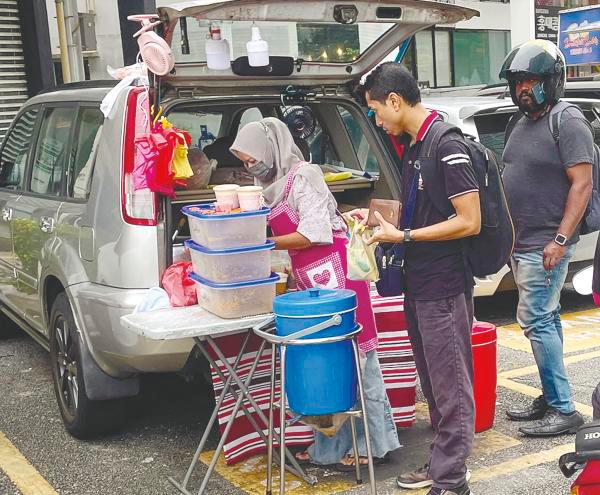PETALING JAYA: Car boot sales, which were once an occasional weekend pastime, have now become a regular source of income as many struggle to make ends meet, amid the rising cost of living.
One such entrepreneur is Klang resident Nurin Atiqah Abd Naser, 38, a mother of three aged four to 13.
Working from home as an administrative clerk at a forwarding company, Nurin Atiqah said she and her husband Sofian Zulkifli, 40, face tremendous financial pressure each month.
“With my children’s school expenses, every ringgit counts now. What we used to take for granted, like a family outing for dinner, is now a luxury we cannot afford.”
Nurin Atiqah’s weekly earnings from her car boot sales of Malay kuih range from RM350 to RM400, and go towards paying for her children’s education.
Despite the hard work and having to prepare her kuih before dawn, Nurin Atiqah appreciates the sense of community she has built through her sales, and finds comfort in interacting with customers.
Ipoh-born Rizal Hamid, 22, and his sister Batrisyia, 23, who are studying law at a private university in Petaling Jaya, also conduct car boot sales “as we need the money”.
Rizal told theSun that he never imagined the two of them would be selling things from a car boot to supplement their expenses.
“We started off selling bouquets and gifts for fun during our seniors’ graduation ceremony.
“The decent income we earned encouraged us to continue our car boot sales.
“Since June, we began selling nasi lemak for RM3.50 per serving, along with various side dishes. We can make about RM90 in profit each day from our sales.
“We also joined a Facebook community group that has helped us increase sales during the weekends.”
Rizal said the flexibility of running car boot sales fits well with their studies and the venture has taught them negotiation and customer interaction skills.
Economist Geoffrey Williams said car boot sales offer an affordable and even enjoyable alternative to traditional shopping.
“As living costs rise, individuals are forced to seek additional income sources, often turning to micro-enterprises like car boot sales, which serve as a coping mechanism for those under financial pressure.”
While it offers consumers a chance to find bargains and unique items at lower prices, Williams said car boot sales are a practical way to supplement income, though their impact on overall GDP growth is limited to the local and personal levels.
He said informal economic activities are becoming increasingly commonplace and significant as people move away from formal employment, which often offers low pay and very little flexibility.
“People are increasingly embracing independent and entrepreneurial pursuits to raise their income. In the absence of a social safety net, they are taking charge of their economic future.”
Williams also predicted that soon, there will be an increase in micro-enterprises that could lead to greater financial independence among low-income individuals as businesses like car boot sales continue to grow.
However, Universiti Putra Malaysia Business School lecturer Assoc Prof Dr Ida Md Yasin said car boot sales are usually a marketing tool and not so much a direct indicator of rising living costs.
“Car boot sales offer a budget-friendly way for people to buy and sell items, including affordable food and goods, which would be more expensive in a traditional retail setting due to overhead costs.
“The concept of a circular economy, which emphasises reusing and recycling over discarding products, is exemplified by car boot sales. This approach helps reduce waste and encourages the sustainable use of resources.”
Ida also said car boot entrepreneurs could create competition for traditional retail businesses, even though the impact would be minor.
“As their sales continue to grow, local governments should support car boot entrepreneurs by providing them the necessary space and infrastructure so their business can be carried out more systematically and flourish.”









